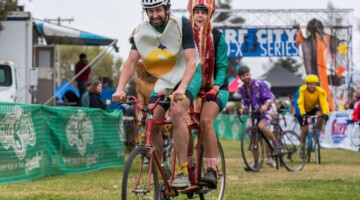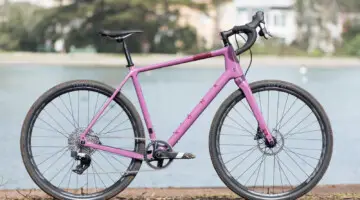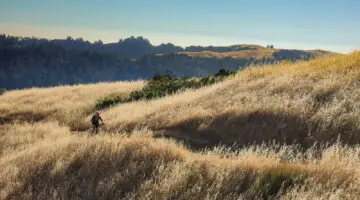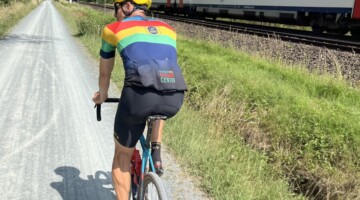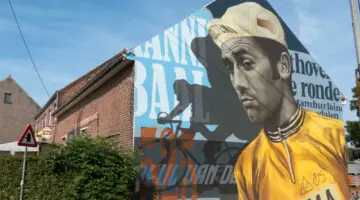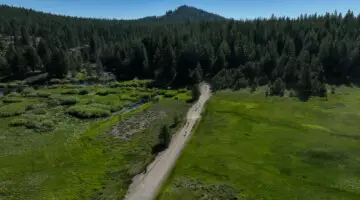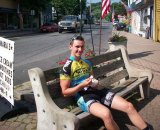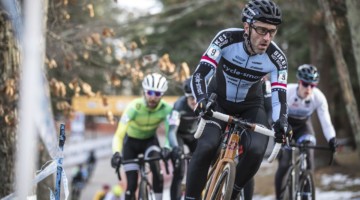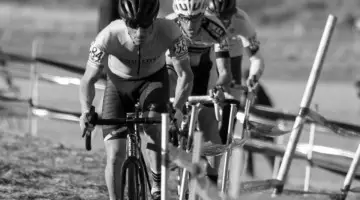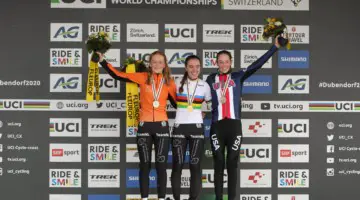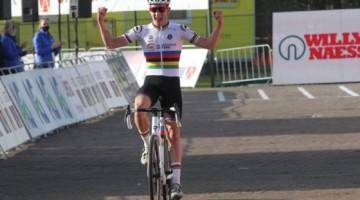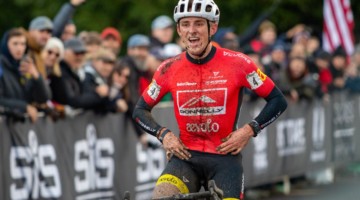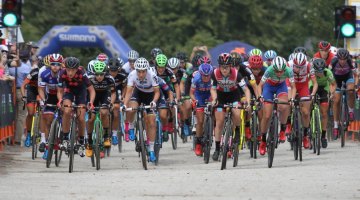You can’t talk about American cyclocross without mentioning the Keoughs. You also can’t go to a major race without running into at least one of the five brothers.
Luke Keough is remarkably mature for his age, and rightly so: though he’s only 19 years old, he’s been racing for 15 of them and is extremely serious about what he does. That’s not to say that he doesn’t love horsing around with his teammates, weaving around on the road during recovery rides so he can hop into ditches on his road bike, eating ice cream as recovery food or spending an evening at the mall goofing off, but when he’s on the bike, he’s all business. And as he should be: even at 19, his list of palmares surpasses some seasoned pros: he’s the two-time National Champion for the 17-18 field, placed tenth in the 17-18 field at worlds in Italy, won the Elite race both days at Northhampton at Cycle-Smart International last season and the list goes on.
When we finally found time to sit down and talk while he and his teammates were staying with me for a race, he was back in professional racer mode, talking seriously about his goals for next season, his training and how it feels to be the youngest man on his team right now. Interviewing Keough was interesting, since Cyclocross Magazine interviewed him three years prior, when he was still a 16-year-old junior racer setting the world on fire with his cyclocross skills. Now, he’s out of high school, moved up to U23 and fully focused on racing.
When he talks to you, Luke Keough has the uncanny ability to look you straight in the eye and tell you exactly how he feels about things. He doesn’t sugarcoat his opinions or worry about the politics of cycling; he just wants to race his bike fast. And looking at his race results, he’s doing pretty well in that regard.
Cyclocross Magazine: You’ve had a lot of wins as a junior, but now that you’re U23 and racing in the elite field, which win has been most important to you at this point?
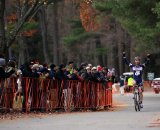
Here, Luke Keough takes his second win at Northhampton in the Cycle-Smart International race. © Natalia Boltukhova | Pedal Power Photography | 2010
Luke Keough: My first UCI win in Delaware was my first win as an elite racer, but the win at Northhampton was great because it had good riders, like Lindine, and just a bigger field than the first race. So I think the Northhampton win would be my biggest result so far.
CXM: You just graduated high school last year, after home-schooling yourself for two years. Plans for college?
LK: I’m going to race my bike full time, see if I can make a career out of this, do it as long as I can, and then there’s always school to go back to. I’d probably go for an engineering degree, I was always good at math and that kind of stuff. Or physics, I really like physics. School was easy for me, so I feel like I could pursue something in that area.
CXM: So, do you think about laws of physics while you’re on the bike?
LK: [laughing] I just think about not getting dropped.
CXM: What’s it like being the youngest one on a lot of your teams?
LK: It’s interesting. My team right now, I’m technically the youngest, but theoretically, I feel like I might be up there in the maturity level, maybe surpassing some of them. [Ed. Note: the previous day, Keough egged his teammates on in a soy sauce drinking contest.] Well, maybe immature sometimes. It’s fun.
CXM: Is it weird having a team manager for road that you race again in cyclocross, and occasionally beat? [Adam Myerson is the team manager for Team Mountain Khakis, but raced for Cycle-Smart and against Keough during cyclocross season.]
LK: I don’t know if weird would be the word to describe it. He has so much experience from cyclocross, that’s kind of one of the reasons I’m on the team. Racing with him on the ’cross bike and knowing him through the years racing, that’s part of why I’m on this team. But yeah, it is weird beating the Adam Myerson. He knows so much, and he’s working his way to the management side of the sport more now. He’s great at passing on information, which is even more helpful, since he’s got plenty of it.
CXM: He is one of your top victims on crossresults.com, do you check that all the time now?
LK: I have looked at it, that’s for sure.
CXM: What are your goals for the fall season?
LK: Mainly to have a good early season. Right now, I’m looking at racing the GP series, so traveling a lot, hopefully getting the U23 jersey again. My real goal is just consistency. It’s been my goal for the past few years; it’s a long season.
CXM: Do you and your brothers have similar goals for the season; are they doing the same races?
LK: Nick’s a first year senior so he’s out of the U23 series, so he might stay in New England and try to get the Pro series leader’s jersey. Right now it looks like Jesse, who’s also U23, will also stay in New England and race for the U23 jersey. So, we’ll go for all the jerseys.
CXM: What about the new New England pro series that’s coming out of the Verge Series?
LK: Well, that could change the season plans. With the scale Adam’s talking about, it could definitely change the whole season. He wants it to be on scale with the USGP stuff, so that could really change things.
CXM: Are you planning on racing any of the big non-USGP races, like Cross Vegas?
LK: If I was going to do one, it would be Vegas. I might go out not to race but just to see the sponsors.
CXM: Who would you count as your mentor for cycling? You have your brothers and you have Adam as team manager, so you have a lot of possibilities.
LK: I’d have to go with Jake, my oldest brother, as my mentor. He might not have the experience that Adam has, but he’s working his way through it, he started at the lowest rung and he’s coached himself and grew by himself.
CXM: Plus, you’ve gotten to see his progression, through every step.
LK: Exactly. I’ve watched him go through it, and I’d like to follow in his footsteps as far as racing. But I’d like to stay in cyclocross a little longer than he did.
CXM: What are your thoughts on Nationals being moved to Madison in January?
LK: That’s the hot topic of the year! It’s amazing the consistency of the thoughts: no one really seems to be for it. People racing a road season, it makes it hard, people racing a mountain bike season, it makes it hard. And even for lower categories, trying to travel out there is going to be quite a trial.
CXM: Some people we’ve talked to are happy about making the season that much longer, like they do in Europe.
LK: Yeah, but in Europe, that can be someone’s main sport, so a long season makes sense. In the US, you have to race a road season and a ’cross season, or a mountain bike season and a ’cross season.
CXM: You’re from New England, so don’t you think the cold, snowy stuff in Madison will be easy for you?
LK: I’ll probably have to go somewhere else to train because I train all year in New England but the quality of training gets difficult, especially for ’cross. Trying to ride off-road when there’s feet of snow is tough. But if it comes down to it, I don’t think it’ll affect the race.
CXM: So, another question on everyone’s mind: disc brakes in cyclocross, yay or nay?
LK: Another big topic – Nationals and disc brakes! It kind of feels like the industry just needed something else to sell. It’s kind of bad to say that, but that’s how it feels to me. To get disc brakes means not just the brakes, but a lot of stuff to accommodate them as well – new bikes, new wheels, new forks. It’s not just changing your brakes. There is theoretically a performance benefit to disc brakes though.
CXM: But do disc brakes take the “romance” out of cyclocross?
LK: My teammate Travis Livermon was talking about that and was like, “it’s cyclocross, you’re not supposed to be able to slow down, so what’s the point?” It’s full gas for an hour; you don’t need to slow down. There are times, like at the World Championships in the Czech Republic, it was so icy and slippery that people couldn’t slow down and it was actually dangerous; you couldn’t slow down into turns, but that just meant you had to take precautions. But everyone was having the same problem. There will be an advantage if they work the way they’re supposed to work though.
CXM: You travel a lot for racing, but do you ever get to take an actual vacation?
LK: My vacations usually come at the end of the season, actually, it comes when I train for ’cross. I go up and we race the Green Mountain Stage Race in Vermont, and we usually do three weeks before that where we rent a place up there, so my vacation has training in it, but riding up in Vermont and hanging out there is very cool. But really, I only get two weeks a year off the bike, and that’s going to come at the beginning of August so hopefully I get a little break there. I was thinking about taking my off-season in either Tasmania or Australia because a lot of my brother’s teammates live down there so we’re talking about going there and hanging out. That would be the only break.
CXM: Sounds like you’re gone a lot, how many weeks during the year are you actually home?
LK: This year is the biggest change, because other years I was a junior. This year for road it’s been like no other season. I’ve been on the road all but two weeks since the beginning of March.
CXM: Does the Keough homestead have a giant cyclocross training ground in the backyard?
LK: Our backyard is actually a BMX track, we have a pretty legit track with dirt jumps and trails. That’s how we started, we were just out there every day building jumps, digging holes and then it got serious. We live on a couple golf courses so we have some really nice trails, we live a mile away from a thousand acre state park so we can train there, it works out well. We set up PVC barriers and practice on them.
CXM: How do you train in the summer, other than by racing road?
LK: You need to do specific training. All day yesterday, it sounded like we weren’t doing much [Ed. Note: the team was in the basement catapulting each other off of air mattresses.] but we actually did a lot of scheduling, which we hadn’t done all year, because there are other ’cross guys on the team, and we were comparing schedules. But for specific ’cross stuff, you have to take a break in the middle of summer because you need to rest for ’cross, so we talked about a two week block of base training, since you need to build that back up, and then it’s ramping up using intensity of races, but you still need the base, so you train through all the road races at the end of the season. So that’s really how you try and switch seasons, but specifically for the road season, you build base at the end, you don’t really focus until the end of the season.
CXM: If you didn’t race road, do you think your results would improve or decline?
LK: I don’t know that they would change much, but the road season would be a lot more training instead, and I don’t know if I could handle that much training. It’s not the effort, but I train to race. That’s one of the hardest things in the winter – you’re training through all the weather, you’re just training for five, six weeks at a time, you’re riding the bike to no end. I’ve raced both seasons since I was 14 though, so I don’t know how my results would change.
CXM: What’s your advice for new riders?
LK: This is what I love about the sport: even Cat 5 racers can get into it and be racing someone, which is an amazing part of the sport. Even if you’re just racing the guy in front of you or not trying to get caught by the guy behind you, everyone’s having fun in their own little race within the race. So, if you’re trying to get into it for fun, just keep it fun. Don’t get discouraged. It’s so fun seeing people riding around in the mud and they’re loving it. But if you’re trying to be really serious about it, I would say practice the skills. Turning, barriers, little techniques you can always practice. Don’t take each race too seriously either: focus on it, but you can’t base the whole season off of one race.
CXM: Yesterday, we were sitting around reading your interview with Cyclocross Magazine in Issue 3 from when you were 16. Do you have any revisions you’d like to make to any of your answers, or do you have anything you would have done differently?
LK: That’s a tough question! I feel like it’s all gone pretty well so far. That was my first year as a 17-18 racer. That was my first elite junior national championship, it was an exciting season; I was undefeated until worlds. It’s hard to compare a U23 season now to a junior season then. I don’t think I would have any advice for my 16-year-old self, but there’s definitely 16-year-olds out there that could use some more advice. Definitely, for racers, keep it fun, and I feel like I’ve done that correctly. Make sure it’s fun and if it’s not, don’t do it. You and I talked yesterday about if I ever got burned out, since I’ve been racing for 15 years. But I’ve always loved doing it. The days I really don’t want to go out on the bike are the days that are the most satisfying afterwards, you know you did it and benefited from it.
After our interview, I went on to spectate and Keough went on to place tenth in the Basecamp International (NRC) criterium with his current road team, Team Mountain Khakis. He’s having a solid road season, and a stellar ’cross season is sure to follow.





